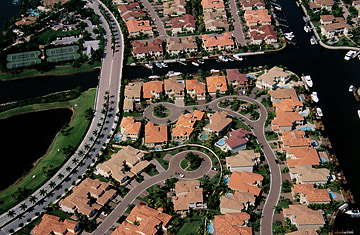
Homes in Miami.
When Florida lawmakers gathered in Tallahassee in March to embark on an overhaul of a local tax system that critics claimed had run amok, they weren't modest in their professed goals. They called for nothing less than a property tax revolution similar to that which enveloped California a generation ago, one they claimed was needed to stop the once booming state from squeezing out its middle class. "We all agree that property taxes are too high," state House Speaker Marco Rubio told members on the first day of the session. "Now let us spend the next 60 days debating on what is the best way to bring them down. And if we do, not only can we solve the property tax crisis, we will help usher in a new political culture that will be the envy of the nation."
But so far, all Florida has shown America is how hard the kind of radical tax reform that marked the 20th century may prove to be in the 21st. What started out as a Sunshine State battle cry last spring ended in a whimper this fall as advocates watched dramatic changes get whittled away by the courts and opposition from local governments, school districts and a more cautious state senate. Bold plans that included doing away with property taxes altogether fell by the wayside, as did efforts to phase out a popular but controversial property tax cap that has caused much of the problem. Following not one but a series of special sessions on the issue this year, lawmakers are now asking Florida voters, in a January referendum, to approve reforms they say would reduce property taxes by only $12 billion over five years — a far cry from the $85 billion the State House had originally suggested and the more than $31 billion cut supported by Governor Charlie Crist.
The reformers met stiff resistance from cities and counties that rely on property taxes to keep the lights on — and, in many cases, spent like sailors during the real estate boom and now find their coffers depleted during the current real estate bust. Crist and Tallahassee also failed to convince the public how they'd achieve the cuts without injuring a school system that remains one of the most underfunded in the country. Instead of sweeping changes, the politicians now talk of incremental steps they'll pursue over the next several years to provide tax relief to homeowners, renters, snowbirds and businesses. That may not be fast enough; the state is rapidly losing its allure as a low-cost haven — so much so that a Zogby International poll this year that showed half of South Floridians and 37% of all Floridians are considering leaving the state.
Voters, however, may not wait around for lawmakers to continue tinkering. Frustrated by legislative inaction, grassroots tax reformers are now considering following California's Proposition 13 example from the 1970s and shooting for citizen-driven initiatives to cap what local governments can spend by tying local budgets to cost-of-living increases and economic growth. "Legislators dropped the ball, absolutely," said Margie Patchett, executive director of Volusia Tax Reform, one of a dozen groups that have formed to change the property tax structure with an eye toward a possible 2010 ballot initiative. "They had a perfect opportunity to do something significant and they lacked the political will and courage to do it."
The January referendum proposal being pushed by the state retains a 3% cap on property tax assessment that had been put in place in 1992 for homeowners who have lived in a house for more than a year. The cap is widely popular, but it has also led to widespread disparities, especially along Florida's teeming coastline, where some property values have doubled over the past five years. That's because when a house is sold the cap no longer applies — creating absurd situations in which neighbors with similar homes pay wildly disparate property taxes. Because of that lingering inequity, some believe the Florida courts could eventually end up throwing out the entire system.
Reformers did manage to get some relief for homeowners. Lawmakers doubled the $25,000 exemption on taxable home value that Florida homeowners currently receive. And growing families and elderly downsizers would also get some much-needed help. Both groups have long complained that they are trapped in their current homes because they can't afford to pay taxes on new houses that are not protected by caps and were assessed at skyrocketing market values, but they now be able to offset some of the costs of moving into new homes in Florida by taking up to $500,000 in accrued tax savings with them. In that sense, "what the legislature did is a great beginning, but we're not done," says Ken Wilkinson, who spearheaded efforts in the early 1990s that culminated in passage of the Save Our Homes amendment (which included the 3% cap). "I've always said you get what you can get and you come back for more."
But Patchett argues that businesses and second homeowners got left out. "They provided relief to the one group [first homeowners] that doesn't need it," she says. "They did not do anything for renters, landlords and commercial property." As a result, reformers acknowledge that citizens will likely take the issue into their own hands. A handful of groups have already sprung up to challenge the proposals, and Rubio and other legislators say they know it's only a matter of time before they start gathering signatures. Until then, Rubio and other reformers will keep sounding the alarm that Florida's property taxes, coupled with soaring property insurance rates, are pricing the state out of reach for the middle class and the businesses they attract.
